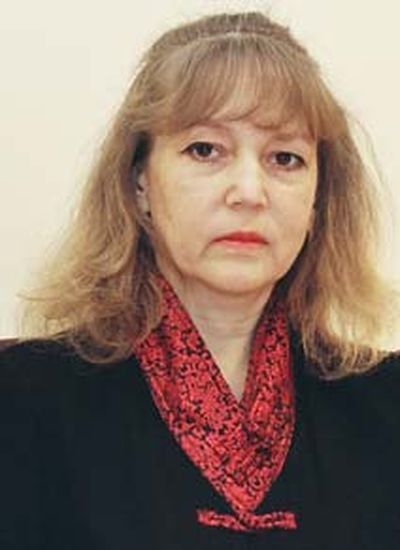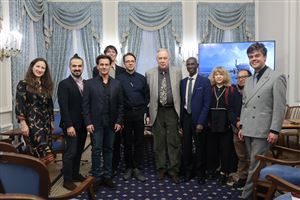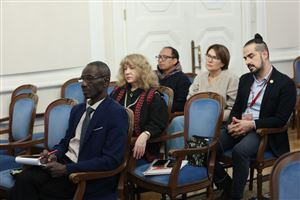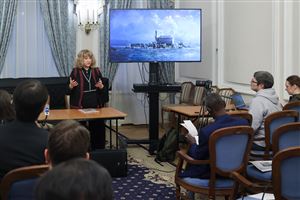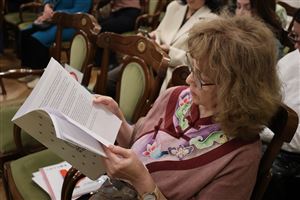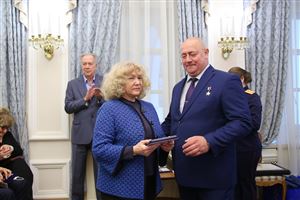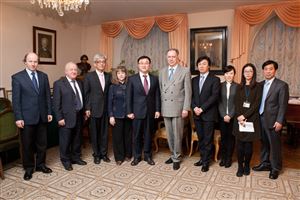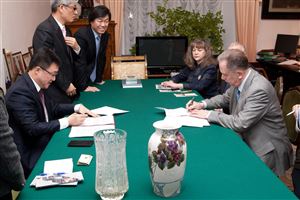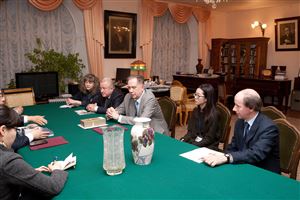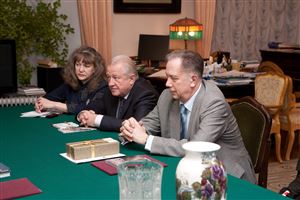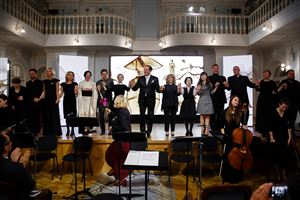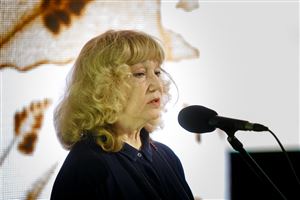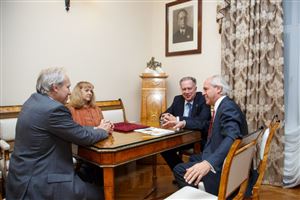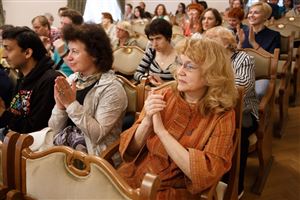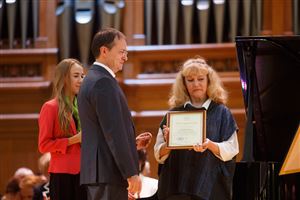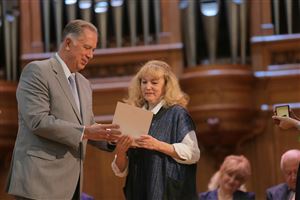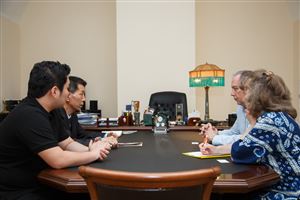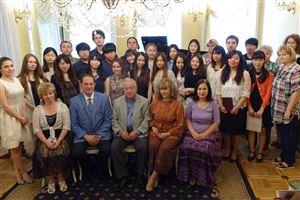Born in Chelyabinsk (Southern Ural). Graduated from Tchaikovsky Moscow State Conservatory’s Faculty of Music Theory and Composition in 1983 (teacher: Acting Prof. Dzhivaní Mikhaylov). Postgraduate student at the Moscow Conservatory’s Department of Foreign Music History in 1986–89 (research adviser: Acting Prof. Dzhivaní Mikhaylov).
PhD thesis “Special Features of the Development of Khayal, Urtyn duu and Blues as Musical Genres and Their Functioning in the Cultures of South and Central Asia and of North America” defended in 1990 (The Georgian Soviet Socialist Republic’s Shota Rustaveli State Institute of Theater, Tbilisi).
Executive Secretary for Russia’s National Committee of the UNESCO’s International Music Council in 1993–99.
Head of the Department of Coordinating Tchaikovsky Moscow State Conservatory’s International Programs in 2003–15 (currently the Department of International Affairs).
Awards:
- Medal Dedicated to the 850th Anniversary of the City of Moscow (1997);
- Certificate of Merit, with the Paulownia Crest on a Silver Award Cup, of Japan’s Ministry of Foreign Affairs (2005);
- Medal Dedicated to Toktogul Satylganov’s 150th Anniversary (Bishkek, 2014);
- Certificate of Merit of Russia’s Minister of Culture, Silver Badge of Merit for the Service to the Moscow Conservatory, and Japan’s Order of the Rising Sun (Gold Rays with Rosette; all three in 2016).
Also awarded with a number of diplomas, certificates of acknowledgment and letters of recognition from various foreign embassies and international organizations for carrying out versatile activities in the area of international affairs.
Author of scripts and organizer of musical stage productions:
- “Yugao, the Evening Face,” “Returning from Gifu,” and “The Garden of One Flower” (2000);
- “The Spring Sea” and “Seven Stories about the Beautiful Komachi” (2001);
- “Style and the Flower” / Fūshikaden / 風姿花伝 (2002);
- O-Natsu (2005–15).
Organizer of a variety of events in the course of cultural cooperation with foreign countries, among which to be mentioned:
- “Traditional Music and Dance in the Open Realm of Culture,” an international symposium with participation of Guy Huot, Secretary General of the UNESCO’s International Music Council (1996);
- “Traditional and Today’s Theory and Practice of the Music of India,” an international seminar (1998);
- “The Many-faced Chronos musicus,” an international scholarly and practical seminar (2000);
- “Sonic Archetypes of the Indo-European Cultural Commonness,” an international round table (2012 & 2013);
- “Musical Map of the World,” an annual international symposium (2014–16).
Author of the concepts and artistic director of annual international festivals:
- “The Heart of Japan” (since 1999);
- “The Universe of Sound” (since 2003);
- “We Gather Friends” (since 2007).
Manager of research projects under the grants of Russia’s Foundation for Basic Research and Ministry of Culture:
- “Sonic Archetypes of the Indo-European Cultural Commonness” (2013–15);
- “Russia and Iran: Innovational Methods of the Cross-cultural Interaction” (2015);
- “Russia and Iran: Historical Crossings and the Future of Cultural Interaction” (2015–17).
Author and academic adviser of a series of international art projects, including:
- “Meetings at Heaven’s Bridge” (Russia — Japan, 2005);
- “The Descendants of Arctide” (since 2009);
- numerous others.
Organizer of concerts, theatrical performances, seminars, lecture courses and workshops taught and demonstrated by representatives of various cultural traditions throughout the world.
Dr. Karatygina pays her great attention to public enlightening campaigns: she has prepared a series of radio and TV programs related to world music cultures.
Teaching activities:
Music theory courses at the School of Music and Choreography in Ulaanbaatar (Mongolia, 1983–85).
Assistant and Senior Teacher at Tchaikovsky Moscow State Conservatory, Lomonosov Moscow State University, Bauman Moscow State Technical University, and Russia’s Patrice Lumumba University of Peoples’ Friendship (since 1985).
Additional training courses of Japanese traditional music supervised by Keiko Iwahori, Head of the Kyoto Branch of the Tadao Sawai School of Koto. Master (shihan), with the right to open her own school (2003).
Teaches a series of courses on world music cultures (“Music Culture of the Far East,” “Music Culture of South Asia,” “Music Culture of Central Asia,” “Playing on Musical Instruments of the World,” and others) in various cities of Russia and abroad (China, Greece, Japan, Kuwait, Mongolia, Republic of Korea, and other countries).
Supervisor of the classes of Chinese, Indian, Iranian and Japanese traditional music at the Moscow Conservatory’s Scholarly and Art Center World Music Cultures on a regular basis.
Students (of various years):
- Marina Vavilova; Eugenia Glukhova; Tatiana Kartashova, D.A.; Natalia Klobukova, PhD; Anna Kozyatnik, PhD; Nina Starostina (Russia);
- Ahmad Naser Sarmast (Afghanistan);
- Burak Tüzün (Turkey);
- Zhang Suhua (PRC, Hohhot); Chen Yi-ting (PRC, Taiwan).
Some publications (selective list):
- Cult of Horseman and Draught-Animals in Musical Traditions of the North and West African Nomadic Peoples. (1989) In: Proceedings of the World Congress of Africanists. Budapest.
- About Common Features of Nomadic Peoples’ Music Traditions. (1990) In: Proceedings of the Seventh International European Seminar of Ethnomusicologists. Berlin.
- Music Culture in Nigeria. (1992) In: Nigeria Today: a handbook. Мoscow.
- The Musical Genre as a Subject of Ethnomusicological Researches. (1992) In: Materials of the European Seminar of Ethnomusicologists. Geneva.
- Far Eastern Musical Culture and the Ways of Its Studying in Russia. (1996) In: The 26th General Assembly and Symposium of International Music Council. Seoul.
- Ha-uta — the Unknown Japan. (2003) In: Hogaku-no tomo [Friends of Japanese Traditional Music]. February. (In Japanese).
- “Musical Multiculturalism” and Modern Possibilities of Intercultural Understanding through Sound and Music. (2008) In: The Plurality of Scholarly Concepts in Musicology: a collection of articles dedicated to E. M. Levashyov’s 60th anniversary. Moscow. (In Russian).
- Pax sonoris as a Subject of Modern Musicology. (2008). In: “Pax sonoris”: History and Modernity (in memory of M. A. Etinger): an annual collection of articles on musicology. Vol. 3. Astrakhan. (In Russian).
- Word in Music, Music in Word, Music as Language, Language Music. (2008) In: Seminarium hortus humanitatis, an almanac. Issue 22. Riga. (In Russian).
- Sound Archetypes of the Indo-European Cultural Commonness. (2011) In: The Development of Russian-Iranian Cooperation in the Area of Iranian Studies: Russia’s First Conference of Iranists. Moscow. (In Russian).
- Music as Knowledge — Musicology — Musical Scholarship: the Tradition of Understanding the World of Music through World Music Cultures. (2015) In: Musical Scholarship in the 21st Century: Paths and Searches: materials of the International Scholarly Conference Dedicated to the 70th Anniversary of Russia’s Gnessins Academy of Music (14–17 October 2014). Moscow. (In Russian).
